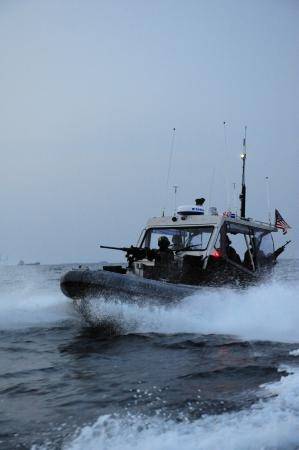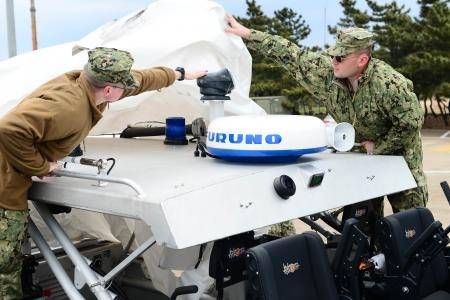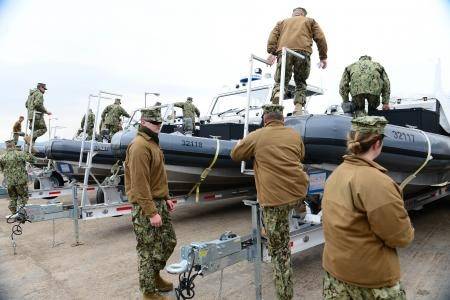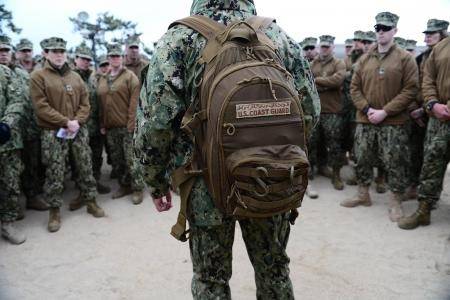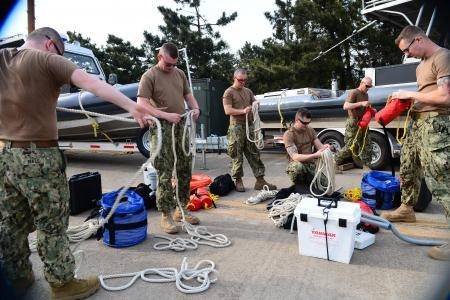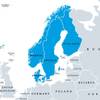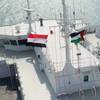International Logistics from Washington to Korea
On a journey that would take more than five weeks, six 32-foot transportable security boats (TPSBs), two pick-up trucks, six boat trailers, and 15 five-ton storage containers traveled more than 5,000 miles across the Pacific Ocean from Everett, Washington to Pohang, South Korea.
Coast Guard Port Security Units 311, 312 and 313 mobilized 80 tons of gear and more than 100 personnel to participate in one of the largest, international military exercises on the Korean peninsula, Combined Joint Logistics Over the Shore Exercise (CJLOTS).
CJLOTS is an annual exercise comprised of more than 1,200 U.S. military personnel from 43 commands working in conjunction with the Republic of Korea’s military forces.
For Coast Guard Lt. j.g Logan Huffman, PSU 313’s assistant logistics officer, this deployment would prove not only to be a unique experience, but a challenging one as well.
“CJLOTS gave me a valuable education about the Army, Navy, and Marines, in terms of what they could provide and how they conduct business,” Huffman said. “That’s what’s invaluable about working within a combined command- if you can’t get something done, you can go to your counterparts for help and support.”
Working side-by-side with Republic of Korea military, Coast Guard crews provided 24-hour force protection security on the water and on shore during CJLOTS that tested the PSUs ability to deploy within 96 hours of being recalled for duty, to be operational within 24 hours of deployment, and to be self-sufficient for 30 days in support of operational commanders world-wide.
According to Huffman, transporting cargo by ship works on a “first come, first served basis,” so he arranged for PSU 313’s equipment to be delivered nearly four days prior to the ship date, in anticipation of possible delays.
“I was previously trained in airlift planning, which PSU’s typically use (to ship equipment for deployments), but in this fiscal environment sealift was preferred,” Huffman said. “Timing and planning was key and I had to ensure all of our gear was delivered to the pier for shipment, far in advance our actual deployment date.”
Huffman and an advance crew of 16 personnel from PSU 313 arrived early to South Korea to receive the shipments and secure the crew’s equipment, hoping that when PSU 313 arrived, they could transition into camp and operations seamlessly.
During those first few days, Huffman and his advance team worked through numerous unforeseen obstacles like learning the type of fuel that had been designated for Coast Guard use was incompatible with PSU 313’s boats, so he and his advance team worked with interpreters to secure appropriate fuel through a local vendor.
“As problems arose we constantly had to troubleshoot,” Huffman said. “We had to be innovative and adaptive, and we had to build relationships with other military branches. This was the true value of the exercise.”
As vital as the relationship with fellow military agencies was to the success of PSU 313, Huffman was most grateful for the 16-person advance team that helped him work through the unpredictable challenges that arose in those first few days.
“I was really lucky to have such a great team helping me through the daily challenges we encountered upon arrival,” Huffman said. “Everyone knew what they were doing. When I was approached with a problem I would share it with them, and they would come up with solutions within an hour. I couldn’t have done it without them.”








